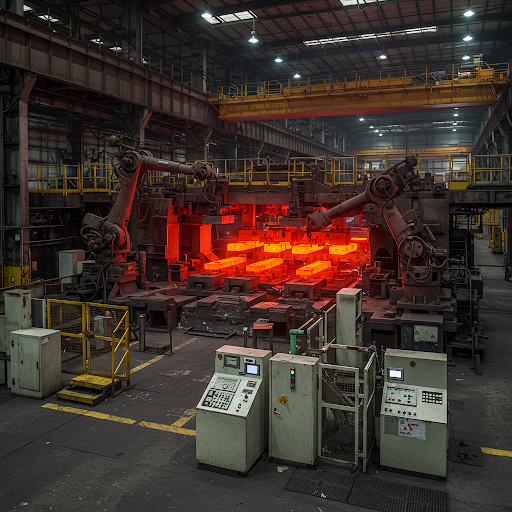Raw Material Handling
At Active Steel Forge, we recognize that the foundation of…

At Active Steel Forge, we recognize that the foundation of…

At Active Steel Forge, we offer advanced heating facilities designed…

Experience unmatched cutting precision and efficiency with our advanced cutting…

At Active Steel Forge, our advanced forging facilities offer unmatched…

At Active Steel Forge, we specialize in providing advanced heat…

Experience unmatched precision and superior quality with our advanced CNC…

4 min Read
In-house steel forging has become a game-changer for manufacturers looking to optimize efficiency, enhance quality control, and reduce costs. By managing the entire forging process internally, companies can achieve higher precision, faster turnaround times, and superior product performance. This guide explores the top 10 advantages of in-house steel forging for precision manufacturing.
When forging is performed in-house, manufacturers have full oversight over quality standards. This ensures strict adherence to specifications, minimizing defects and enhancing product consistency.
By eliminating reliance on third-party suppliers, companies can significantly reduce lead times. In-house operations allow for quicker turnaround, enabling just-in-time manufacturing strategies.
Forging in-house eliminates transportation and outsourcing costs, leading to long-term savings. Businesses can better allocate resources and reinvest in technology and innovation.
With in-house capabilities, manufacturers can easily adapt to changing customer demands. Custom designs and specialized forging processes can be implemented without external constraints.
In-house forging allows smooth integration with machining, heat treatment, and finishing processes. This ensures streamlined workflows and improved overall efficiency.
Handling the forging process internally minimizes the risk of design leaks and intellectual property theft. Companies can maintain confidentiality and safeguard proprietary technologies.
With direct control over production schedules, manufacturers can optimize inventory levels. This reduces excess stock, minimizes waste, and improves cash flow management.
In-house forging ensures a steady supply of raw materials, reducing dependency on external vendors. This stability helps mitigate disruptions and maintain consistent production output.
Modern in-house forging facilities incorporate energy-efficient technologies, reducing carbon footprints. Companies can implement eco-friendly practices, enhancing sustainability and regulatory compliance.
By managing forging operations internally, companies gain a strategic edge in the market. Faster response times, superior quality, and cost efficiencies enhance competitiveness and customer satisfaction.
In-house steel forging offers numerous benefits, from cost savings and enhanced quality control to greater flexibility and supply chain stability. Companies investing in in-house forging capabilities position themselves for long-term success in precision manufacturing. By leveraging these advantages, businesses can ensure superior product performance, operational efficiency, and sustained growth in a competitive market.
Get in touch with our experts today
